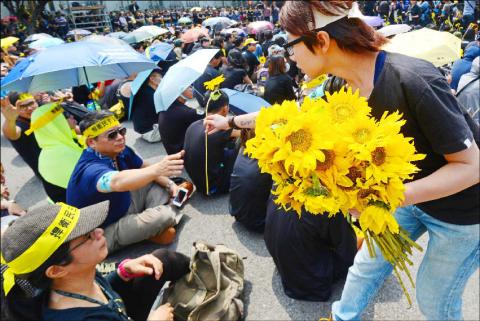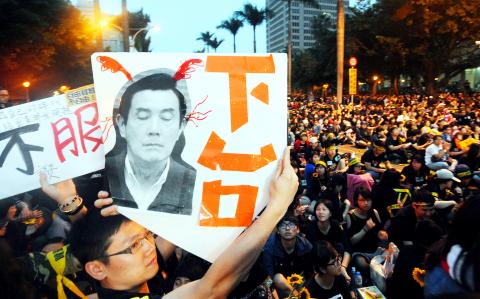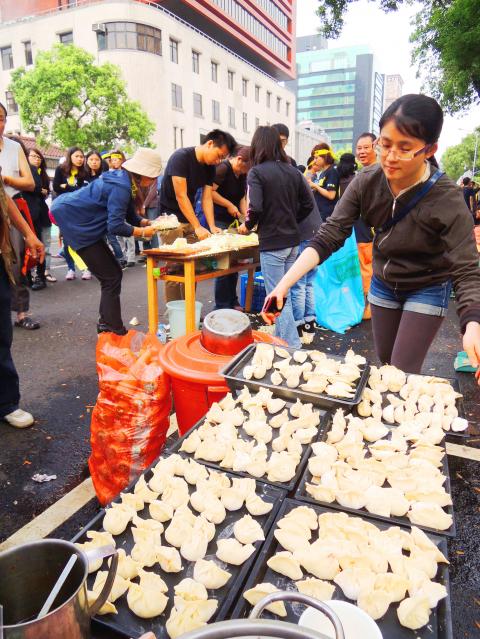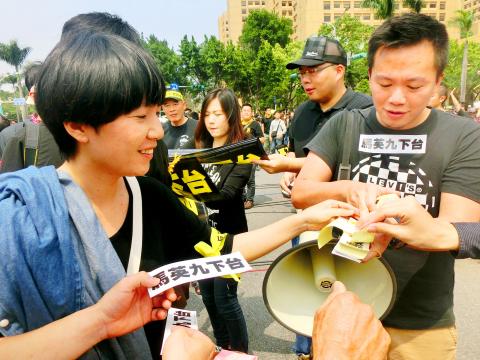From all walks of life, supporters of the “Sunflower student movement” took to the street in Taipei yesterday, marked by festivity, diversity and order.
An hour before the scheduled start of the event at 1pm, the “black-clad army” — dress code for the protest against the government’s handling of the controversial cross-strait service trade pact — emerged from nearby MRT stations and packed the designated protest site in front of the Presidential Office Building on Ketagalan Boulevard.
“I am here to support these students. I’m here out of guilt because people of my generation have done too little. We owe these kids a better Taiwan,” said Chiu Shih-lung (邱仕龍), who is in his 70s.

Photo: Sam Yeh, AFP
Chiu, who came from Greater Kaohsiung, said he supported the students’ cause of safeguarding Taiwan’s democracy and demanding the withdrawal of the cross-strait service pact because “it endangers national security and sovereignty.”
“We must safeguard our island’s interests,” said Chin Mei Ching, a 29-year-old mother who was pushing her one-year-old daughter in a buggy. “We have to guard against China using the economy to control us.”
The majority of the protesters were students and young people.

Photo: Lo Pei-der, Taipei Times
They brought sunflowers, a symbol of the protests, and wore yellow ribbons that read “Fight for democracy, retract the service trade pact.”
Some posed with self-made banners, on which were slogans such as “Condemn state violence” and “I don’t want the service trade pact,” or demanding President Ma Ying-jeou (馬英九) and Premier Jiang Yi-huah (江宜樺) step down.
Alliance of Civil Action Against Ma Ying-jeou spokesperson Shen Chih-lin (沈志霖) stood in the crowd and gave out stickers that read: “Ma Ying-jeou step down” (馬英九下台).

Photo: Chang Wen-chuan, Taipei Times
Shen said he prepared 1,500 of the stickers and distributed them near the Jingfumen (景福門), which directly faces the Presidential Office Building, and 500 of them were taken by eager protesters in the space of one minute.
A man disappointed with Ma’s failed governance suggested Shen print a sticker that read: “Nine percent approval rating, Ma Ying-jeou step down,” adding: “How can Ma govern the nation or gain trust from the people with such a low approval rating?”
Separately, students from Taipei National University of the Arts brought 3,000 sunflower brooches they had made and gave them out to the protesters.

Photo: Lee Hsin-fang, Taipei Times
The students said that about 10 students worked on the brooches from 6pm on Saturday until early yesterday, with NT$30,000 of funds they had raised.
Half of the brooches were given out within 10 minutes, near NTU Hospital MRT Station’s exit No. 1, at 1pm. The students said they kept the rest for distribution at the legislature.
Like their peers at the week-long sit-ins around the legislature compound, besieged by students and other activists and protesters since March 18, university professors made the street their classrooms, holding discussions and having students express their views about the trade deal with China.
A student spoke through a loudspeaker to his classmates from Soochow University, saying that he believed young people “would see a different face of society when they are on the street” and that would be at least as meaningful — if not more meaningful — as studying in the library or doing laboratory research.
Designer Chiang Lin Chia-jen (姜林家真) held a handmade, helmet-shaped umbrella that read: “Don’t hit my head” to protest against the violence the government used against unarmed student protesters at the Executive Yuan on Monday morning.
In front of the Legislative Yuan, a university junior student surnamed Hu (胡) set up a tent with a sunflower painted on it, inviting protesters to help use their fingerprints to color the sunflowers — to symbolize that the student movement is a result of the gathered strength of the people.
Many people lent their fingerprints, and the painting was almost finished by noon.
Hu said she had taken pictures of everyone who left a handprint on it, and that she will upload the photographs and the final painting on a Facebook page, in memory of “the year we stood up for the student movement.”
Yesterday’s protest was aimed at more than just the trade agreement, which was unilaterally passed through its committee without deliberation by Chinese Nationalist Party (KMT) lawmakers on March 17 and sparked the student-led movement, as non-governmental organizations (NGOs), which worked with the students to organize the protest, also took the opportunity to promote their causes.
A total of 22 NGOs, which focused on a wide range of social issues, such as gender, education, culture and environment, set up booths on Zhongshan S Road.
The student movement has received strong support for a reason, Northern Coast Anti-Nuclear Action Alliance chief executive Kuo Ching-lin (郭慶霖) said.
“People support the movement because they understand that Taiwan has a long way to go as a democracy. For years, the government had always made unilateral decisions without consulting the people, such as the construction of nuclear power plants and nuclear waste storage sites,” Kuo said.
“Most people no longer trust the government,” he added.
Politicians have taken a back seat in the protests, with Democratic Progressive Party (DPP) heavyweights choosing to participate in the protest quietly, without drawing too much attention.
Wearing a black shirt, DPP Chairman Su Tseng-chang (蘇貞昌) said he attended the event as a citizen, while former DPP chairperson Tsai Ing-wen (蔡英文) praised the students’ courage and discipline and urged Ma to ease people’s suspicions by making substantial promises.
The DPP Central Committee had instructed its members who plan to take part in year-end elections not to attend the demonstration wearing their campaign vests.
In addition, election flags and campaign vehicles were prohibited at the protest sites.
Additional reporting by Huang Hsin-po and agencies

MORE VISITORS: The Tourism Administration said that it is seeing positive prospects in its efforts to expand the tourism market in North America and Europe Taiwan has been ranked as the cheapest place in the world to travel to this year, based on a list recommended by NerdWallet. The San Francisco-based personal finance company said that Taiwan topped the list of 16 nations it chose for budget travelers because US tourists do not need visas and travelers can easily have a good meal for less than US$10. A bus ride in Taipei costs just under US$0.50, while subway rides start at US$0.60, the firm said, adding that public transportation in Taiwan is easy to navigate. The firm also called Taiwan a “food lover’s paradise,” citing inexpensive breakfast stalls

TRADE: A mandatory declaration of origin for manufactured goods bound for the US is to take effect on May 7 to block China from exploiting Taiwan’s trade channels All products manufactured in Taiwan and exported to the US must include a signed declaration of origin starting on May 7, the Bureau of Foreign Trade announced yesterday. US President Donald Trump on April 2 imposed a 32 percent tariff on imports from Taiwan, but one week later announced a 90-day pause on its implementation. However, a universal 10 percent tariff was immediately applied to most imports from around the world. On April 12, the Trump administration further exempted computers, smartphones and semiconductors from the new tariffs. In response, President William Lai’s (賴清德) administration has introduced a series of countermeasures to support affected

CROSS-STRAIT: The vast majority of Taiwanese support maintaining the ‘status quo,’ while concern is rising about Beijing’s influence operations More than eight out of 10 Taiwanese reject Beijing’s “one country, two systems” framework for cross-strait relations, according to a survey released by the Mainland Affairs Council (MAC) on Thursday. The MAC’s latest quarterly survey found that 84.4 percent of respondents opposed Beijing’s “one country, two systems” formula for handling cross-strait relations — a figure consistent with past polling. Over the past three years, opposition to the framework has remained high, ranging from a low of 83.6 percent in April 2023 to a peak of 89.6 percent in April last year. In the most recent poll, 82.5 percent also rejected China’s

PLUGGING HOLES: The amendments would bring the legislation in line with systems found in other countries such as Japan and the US, Legislator Chen Kuan-ting said Democratic Progressive Party (DPP) Legislator Chen Kuan-ting (陳冠廷) has proposed amending national security legislation amid a spate of espionage cases. Potential gaps in security vetting procedures for personnel with access to sensitive information prompted him to propose the amendments, which would introduce changes to Article 14 of the Classified National Security Information Protection Act (國家機密保護法), Chen said yesterday. The proposal, which aims to enhance interagency vetting procedures and reduce the risk of classified information leaks, would establish a comprehensive security clearance system in Taiwan, he said. The amendment would require character and loyalty checks for civil servants and intelligence personnel prior to